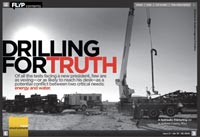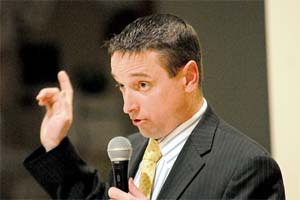Contains the keyword press
"Across vast regions of the country, gas companies are using a technology called hydraulic fracturing to produce natural gas from previously untapped beds of shale."
Fred R. Conrad/The New York TimesEnvironmental concern about hydraulic fracturing is creating political obstacles for gas drilling companies.
The most immediate hazard from the national drilling bonanza, it is clear, involves contamination of residential drinking water wells by natural gas. In Bainbridge, Ohio, an improperly drilled well contaminated groundwater in 2007, including the water source for the township’s police station, according to a complaint filed this year. After building to high pressures, gas migrated through underground faults, and blew up one house.
Here in Dimock, about 30 miles north of Scranton, Pa., 13 water wells, including that of Ms. Switzer, were contaminated by natural gas. One of the wells blew up.
Daniel Gilbert. "Underfoot, Out of Reach: A series on the conflicts over Southwest Virginia's natural gas wealth." Virginia Tri-Cities.com. (online).
Beneath the surface of seven Southwest Virginia counties lie pools of natural gas worth more than a billion dollars a year. Some of this gas belongs to landowners forced by the state to lease their mineral rights to private energy corporations to develop. But instead of putting royalties into the pockets of mineral owners, the state funnels thousands of dollars every month into an escrow fund that royalty owners cannot monitor or access without clearing enormous legal hurdles.
While the system has vastly expanded production of natural gas in Virginia, it has devoted scant resources to ensuring that companies make the required payments into escrow, which in recent years has ballooned to more than $24 million. The result is that companies can produce gas for years without ever filing the necessary paperwork for royalties to be escrowed, and virtually no one notices that hundreds of individual accounts in escrow each month receive no deposits even though the corresponding gas wells are producing gas, a Bristol Herald Courier investigation finds.
To view the special program "The Paper that Made a Difference", produced by WJHL 11Connects, click here for part one, and here for part two of the program.
Articles in this series:
Part Three: The Virginia Supreme Court Weighs In
Part Four: Coal Goes on the Offensive
Part Five: From Crisis to Sustained Loss
Part Six: What is Missing from Escrow?
Part Seven: An Audit Long Delayed
Part Eight: Sue, Split or Do Nothing
Dig Deeper:Resources and links for more information
Do I have money in escrow? How to use our database and determine if you may have money in escrow.
View the members of and contact information for the Virginia Gas and Oil Board
Graphics:
Hydraulic Fracturing
Bristol Herald Courier
How Forced Pooling works
Search our Database for information on escrow accounts, with balances each month, current to March 2010.
See: Tom Vanderbilt. "Paper Trail." Time. Feb. 14, 2011.
Abrahm Lustgarten. Flypmedia. Issue 21. January 16-29, 2009. "Drilling for Truth". Page 11.
Includes photos, graphics and videos.
Experimental Flash based interactive online magazine. Last updated Fall 2009. On April 19, 2010, Flyp announced that it will close.
See: Drilling Wastewater Disposal Options in N.Y. Report Have Problems of Their Own - ProPublica
New York Times Editorial. Published: October 16, 2009.
Regulators must amend the rules to bar drilling in the New York City watershed: a million acres of forests and farmlands whose streams supply the reservoirs that send drinking water to eight million people.
Accidental leaks could threaten public health and require a filtration system the city can ill afford...“fracking” has been implicated in hundreds of cases of impaired or polluted drinking water supplies in states from Alabama to Wyoming.
New York Times Editorial. Published: November 2, 2009.
Among the many dubious provisions in the 2005 energy bill was one dubbed the Halliburton loophole, which was inserted at the behest of — you guessed it — then-Vice President Dick Cheney, a former chief executive of Halliburton.
It stripped the Environmental Protection Agency of its authority to regulate a drilling process called hydraulic fracturing. Invented by Halliburton in the 1940s, it involves injecting a mixture of water, sand and chemicals, some of them toxic, into underground rock formations to blast them open and release natural gas.
Hydraulic fracturing has been implicated in a growing number of water pollution cases across the country. It has become especially controversial in New York, where regulators are eager to clear the way for drilling in the New York City watershed, potentially imperiling the city’s water supply. Thankfully, the main company involved has now decided not to go ahead.
The safety of the nation’s water supply should not have to rely on luck or the public relations talents of the oil and gas industry. Thanks in part to two New Yorkers — Representative Maurice Hinchey and Senator Charles Schumer — Congress last week approved a bill that asks the E.P.A. to conduct a new study on the risks of hydraulic fracturing. An agency study in 2004 whitewashed the industry and was dismissed by experts as superficial and politically motivated. This time Congress is demanding “a transparent, peer-reviewed process.”
Pennsylvania environment officials are racing to clean up as much as 8,000 gallons of dangerous drilling fluids after a series of spills at a natural gas production site near the town of Dimock last week...
...The incident is the latest in a series of environmental problems connected to Cabot’s drilling in the Dimock area. Last winter, drinking water in several area homes was found to contain metals and methane gas that state officials determined leaked underground from Cabot wells. And in the spring, the company was fined for several other spills, including an 800-gallon diesel spill from a truck that overturned.
Site includes extensive background information.
It will be interesting to see how the environmentally sensitive French react to the widespread use of the controversial hydraulic drilling technology known as “fracking” on their home turf.
Toreador Resources, a Texas oil company, has been awarded drilling rights to 750,000 acres of the Paris Basin, its licenses stretching for hundreds of kilometers from St Dizier, on the edge of the Champagne region, to Montargis, just south of the royal palace of Fontainebleau according to an article in The Australian.
Craig Mackenzie, chief executive of the Dallas based Toreador Resources is reported as saying the company wants to start drilling three pilot wells early in 2010, at a cost of US$30million, and to be producing oil from them by the end of the year.
Radio Broadcast. Interview with Mayor Calvin Tilman.
Vast new natural gas fields have opened up thanks to an advanced drilling technique. While natural gas is a cleaner burning fuel than coal or petroleum, extracting it is still hard, dirty work.
Some people who live near the massive Barnett Shale gas deposit in north Texas, have complaints. Health and environmental concerns are prompting state regulators to take a closer look.
Includes transcript. 7 min. 18 sec.
See: Dish Mayor Calvin Tilman Testifies at Railroad Commission - Oil and Gas Lawyer Blog.
See: How Should We Do the Mountain?: Who the heck is Calvin Tilman?
Residents of others states are issuing words of warning for New Yorkers who may soon allow companies to use the "fracking" process to drill for natural gas.
I live and work in Marcellus shale ground zero -- central New York State, just south of the Finger Lakes, one of the biggest and best watersheds in the hemisphere. My home is in economically challenged, mostly rural Tioga County, and I work in Tompkins County. Almost all our neighbors for several miles around have signed gas leases. I participate regularly and actively as a client, colleague, patient, or volunteer with businesses, organizations, and institutions in 19 other New York counties.
I have been economically poor and landless, economically comfortable and landless, comfortable and landed, and poor and landed. I've been rural, suburban, and urban. And I've spent most of my adult life paying state and local taxes in New York State (and a whole lot of national taxes, most of which have gone toward things I do not condone).
Writer Maura Stephens lives in the hills outside Spencer, New York. She wrote this using voice recognition software.
Anne C. Mulkern, Greenwire. May 7, 2009. New York Times.
Fearing a push by House Democrats to regulate a controversial form of natural gas production, an industry coalition [Energy in Depth] launched a campaign yesterday arguing that new rules would kill jobs and batter the economy. [See Sourcewatch: Energy in Depth]
The coalition of independent oil and gas companies says a Democratic proposal to allow new oversight over hydraulic fracturing would slash domestic oil and gas production and cost the Treasury $4 billion in lost taxes, royalties, rents and other payments. But environmentalists and an aide to a Democratic lawmaker backing regulation say the claim amounts to "scare tactics."
...The 2005 Energy Policy Act exempted hydraulic fracturing from regulation under the Safe Water Drinking Act. But Rep. Diana DeGette (D-Colo.) proposed a bill last year to repeal that exemption. DeGette is now talking with Energy and Commerce Chairman Henry Waxman (D-Calif.) about either inserting her bill into pending climate legislation or reintroducing the measure on its own.
"We're hoping to move this forward shortly," DeGette spokesman Kristofer Eisenla said. Without federal oversight, he said, there is no way to really track whether the process is safe.















